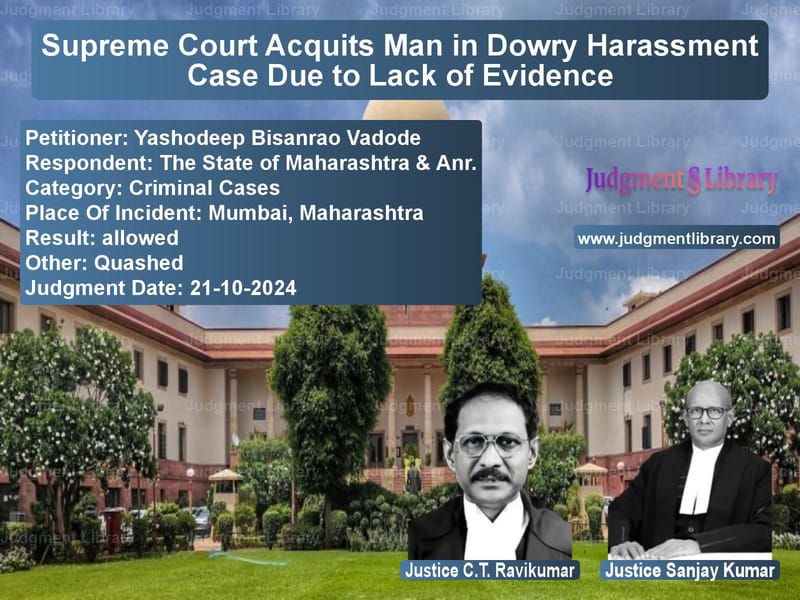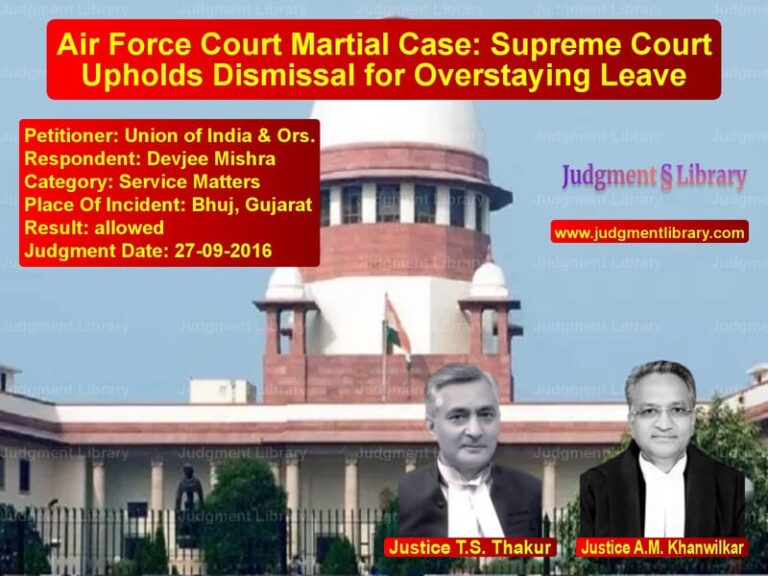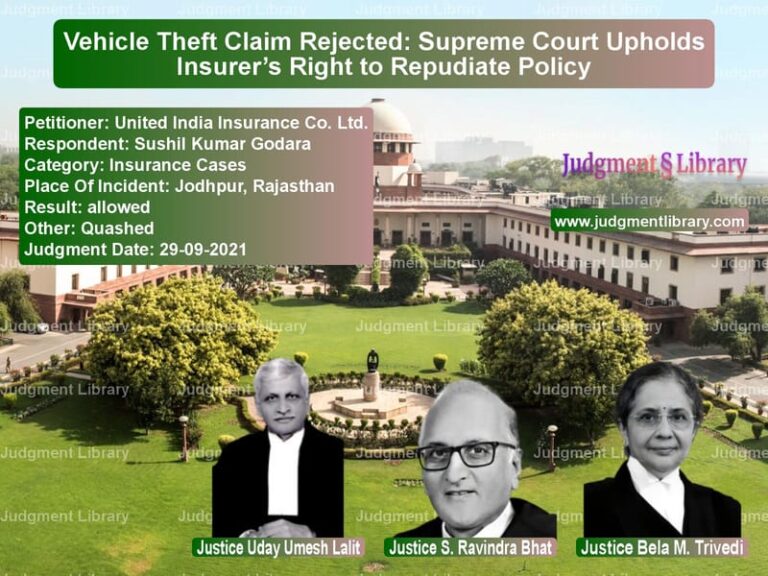Supreme Court Acquits Man in Dowry Harassment Case Due to Lack of Evidence
The case of Yashodeep Bisanrao Vadode vs. The State of Maharashtra & Anr. revolved around allegations of dowry harassment under Section 498-A of the Indian Penal Code (IPC). The Supreme Court was called upon to decide whether the conviction of the appellant was justified in light of the evidence presented. The Court ultimately ruled in favor of the appellant, setting aside his conviction and acquitting him.
Background of the Case
The case originated from an FIR lodged on April 17, 2011, by the father of the deceased, Renuka, at Wadala T.T. Police Station. The complaint was filed following the unnatural death of Renuka on April 16, 2011. Based on the complaint, two Sessions Cases—621/2011 and 853/2011—were initiated, leading to a joint trial of multiple accused, including the appellant.
The prosecution accused the appellant and others of subjecting Renuka to cruelty in connection with dowry demands. The charges framed included:
- Section 498-A IPC: Cruelty by husband or relatives for dowry.
- Section 304-B IPC: Dowry death.
- Section 306 IPC: Abetment to suicide.
- Section 406 IPC: Criminal breach of trust.
Trial Court’s Decision
The Sessions Court convicted the appellant under Section 498-A IPC while acquitting him of all other charges. The appellant was sentenced to:
- Three years of rigorous imprisonment under Section 498-A IPC.
- A fine of Rs. 1000, with a default penalty of two months of additional imprisonment.
Aggrieved by the conviction, the appellant filed Criminal Appeal No. 1014 of 2014 before the Bombay High Court.
High Court’s Decision
The Bombay High Court partially allowed the appeal on December 15, 2020. While it upheld the conviction under Section 498-A IPC, it modified the sentence to the period already undergone by the appellant.
Read also: https://judgmentlibrary.com/supreme-court-quashes-conviction-in-fake-caste-certificate-case/
Arguments Before the Supreme Court
Petitioner’s Arguments
The appellant, represented by legal counsel, raised the following contentions:
- The prosecution’s case was based on general and vague allegations without specific evidence.
- The alleged dowry harassment occurred from January 2010 onwards, while the appellant’s marriage to Savita (Renuka’s sister-in-law) took place only on October 26, 2010.
- The appellant had limited interaction with the deceased, making his involvement in cruelty highly improbable.
- There were no prior complaints against the appellant, nor any witness testimony directly implicating him in dowry harassment.
- The High Court acquitted two other relatives (Accused Nos. 4 and 5) on the same grounds, yet the appellant was convicted despite similar circumstances.
Respondent’s Arguments
The State of Maharashtra, represented by its counsel, contended:
- The prosecution had established a pattern of continuous harassment against the deceased.
- As the appellant was a close relative and part of the household, he had a role in the alleged acts of cruelty.
- The conviction was based on a fair appreciation of the evidence presented before the trial court.
Supreme Court’s Observations
1. Lack of Direct Evidence
The Court noted that despite examining multiple prosecution witnesses, no specific evidence directly linking the appellant to the alleged cruelty was presented.
“A scanning of the impugned judgment reveals that even after detailed discussion of the oral testimonies of the prosecution witnesses, nothing specific was unearthed against the appellant.”
2. Over-Implication of Relatives
The Court observed a tendency of over-implication of relatives in dowry cases:
“It is a matter of common knowledge that exaggerated versions of incidents are reflected in complaints, leading to over-implication.”
The Court referred to Preeti Gupta v. State of Jharkhand (2010) 7 SCC 667, which cautioned against filing exaggerated complaints in dowry-related cases.
3. Acquittal of Similarly Placed Accused
The Court noted that Accused Nos. 4 and 5 (who were also relatives of the deceased’s husband) were acquitted due to lack of specific evidence. The same reasoning should apply to the appellant.
4. Misinterpretation of Evidence
The Court criticized the trial court’s reasoning:
“The trial court and the High Court did not examine whether the appellant had any meaningful role in the alleged harassment. Mere presence in the household does not establish guilt.”
Final Judgment
The Supreme Court ruled:
- The appeal was allowed.
- The conviction under Section 498-A IPC was set aside.
- The appellant was acquitted of all charges.
Conclusion
The Supreme Court’s ruling in Yashodeep Bisanrao Vadode vs. The State of Maharashtra & Anr. reinforces key legal principles in dowry harassment cases:
- Convictions under Section 498-A IPC require specific and credible evidence.
- Courts must be cautious about over-implication of relatives in dowry complaints.
- The prosecution must establish an active role of the accused in the alleged cruelty.
- Acquittals of similarly placed co-accused should be applied consistently.
This judgment serves as a crucial precedent in ensuring fairness in cases involving dowry harassment allegations.
Petitioner Name: Yashodeep Bisanrao Vadode.Respondent Name: The State of Maharashtra & Anr..Judgment By: Justice C.T. Ravikumar, Justice Sanjay Kumar.Place Of Incident: Mumbai, Maharashtra.Judgment Date: 21-10-2024.
Don’t miss out on the full details! Download the complete judgment in PDF format below and gain valuable insights instantly!
Download Judgment: yashodeep-bisanrao-v-vs-the-state-of-maharas-supreme-court-of-india-judgment-dated-21-10-2024.pdf
Directly Download Judgment: Directly download this Judgment
See all petitions in Domestic Violence
See all petitions in Alimony and Maintenance
See all petitions in SC/ST Act Case
See all petitions in Bail and Anticipatory Bail
See all petitions in Judgment by C.T. Ravikumar
See all petitions in Judgment by Sanjay Kumar
See all petitions in allowed
See all petitions in Quashed
See all petitions in supreme court of India judgments October 2024
See all petitions in 2024 judgments
See all posts in Criminal Cases Category
See all allowed petitions in Criminal Cases Category
See all Dismissed petitions in Criminal Cases Category
See all partially allowed petitions in Criminal Cases Category







